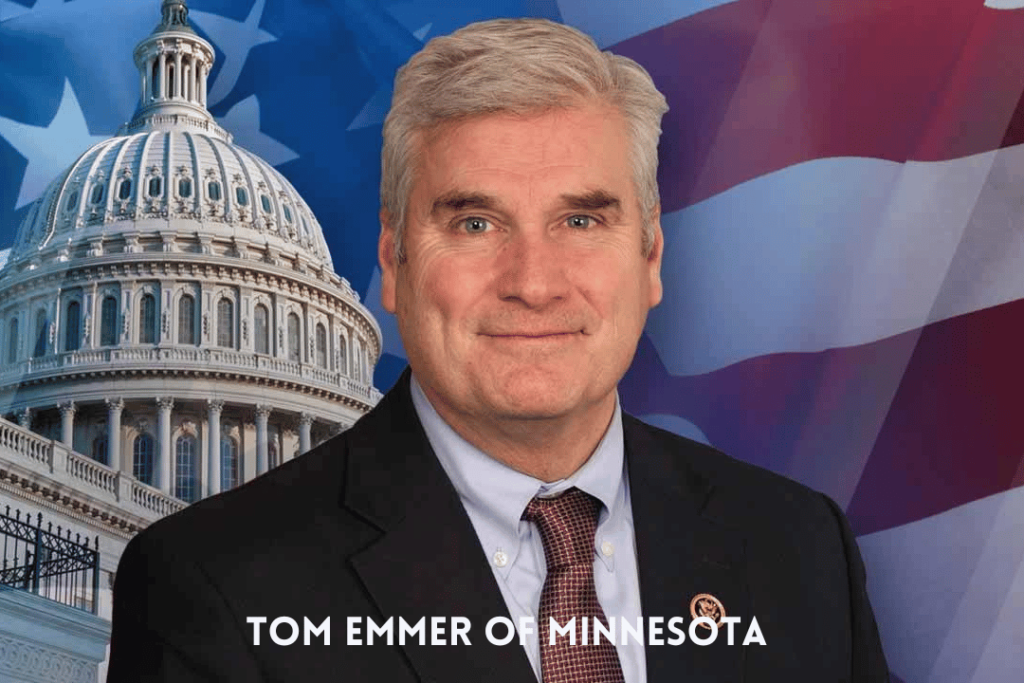The recent turmoil within the Republican Party’s ranks regarding the selection of the House speaker has left the political world in shock. Sudden rise of Representative Mike Johnson of Louisiana as a contender, the fall of Representative Tom Emmer of Minnesota, and the deep divisions that have paralyzed the party.
The Turbulent Path to Speaker Nomination:
The House speaker vote drama took a new turn when Republicans chose Rep. Mike Johnson of Louisiana as their nominee. This action was taken shortly after the previous candidate, Tom Emmer of Minnesota, withdrew because he could not gain 217 votes on the House floor to become speaker.
Emmer’s Bid and Subsequent Exit:
Initially, Tom Emmer had managed to secure the nomination, defeating Johnson and several other candidates. However, he faced insurmountable challenges due to the division within the Republican ranks. With only 221 Republicans in the House, it became evident that the party was sharply divided between conservative and moderate factions, each pushing for their preferred leader in the wake of Kevin McCarthy’s removal.
The House was scheduled to reconvene the following day, and Mike Johnson made it clear that he intended to seek a floor vote. In the critical moment of the speaker nomination battle, he was hinged on securing 217 votes in the House floor vote.
Mike Johnson’s Nomination:
In a significant turn of events, Mike Johnson announced that there were “no votes against” him during the roll call vote meant to gauge support for a potential House floor vote. However, it should be noted that there were some notable absences, and Johnson expressed his willingness to work with those lawmakers.
The Final Round of Voting:
In the final round of voting, the results were as follows:
128 votes for Mike Johnson
29 votes for Rep. Byron Donalds of Florida
44 votes for “other”
Rep. Ken Buck revealed that 43 of the “other” votes were for former Speaker Kevin McCarthy, and one was for Rep. Jim Jordan.
After Mike Johnson’s victory, it was announced that a third ballot had begun, with two remaining candidates: Reps. Byron Donalds of Florida and Mike Johnson of Louisiana. Reps. Mark Green and Roger Williams were eliminated in the second round of voting.
The results of the second ballot:
- 97 votes for Johnson
- 34 votes for “other”
- 31 votes for Rep. Byron Donalds of Florida
- 21 votes for Rep. Mark Green of Tennessee
- 20 votes for Rep. Roger Williams of Texas
- Three representatives voted present
The results of the first ballot:
- Rep. Mike Johnson: 85 votes
- Rep. Byron Donalds: 32 votes
- Rep. Mark Green: 23 votes
- Rep. Roger Williams: 21 votes
- Rep. Chuck Fleischmann: 10 votes (eliminated)
- Notably, at least 30 lawmakers did not vote for any candidate.

Division of House:
The Republican leadership struggle has created a deep divide within the party. This chaotic battle has seen multiple candidates rise and fall, revealing the internal rifts that continue to plague the GOP. The selection of Mike Johnson is just the latest twist in a leadership battle that has seen the party oscillate between mainstream conservatives and far-right hardliners.
Mike Johnson’s Background:
Representative Mike Johnson is a social conservative hailing from Louisiana. He is a lawyer and a former chairman of the Republican Study Committee. He gained prominence for his role in former President Donald J. Trump’s impeachment defense team and his active involvement in recruiting House Republicans to support legal challenges to the 2020 election results. Johnson was also a key figure in Trump’s efforts to contest the election results in Congress on January 6, 2021.
McCarthy Backs Emmer for Speaker of the House Race
Questions Regarding Election Integrity:
When asked about his efforts to overturn the election results, Johnson opted not to comment. This issue has been contentious within the party, with some Republicans accusing him of disloyalty. The party’s internal divisions came to the fore as he secured the nomination.
Johnson’s Conservative Stance:
As an evangelical Christian, Mike Johnson sponsored legislation that aimed to restrict discussions of sexual orientation or gender identity at institutions receiving federal funds serving children under 10. He has also voiced opposition to continued funding for the conflict in Ukraine, which has become a significant point of contention within the GOP.
Vote Totals and Potential Hurdles:
Mike Johnson received 128 votes in the secret ballot, with 44 Republicans voting for nominees not on the ballot, including 43 votes for former Speaker Kevin McCarthy. However, only a few Republicans said they would not support Johnson on the floor. Approximately 20 Republicans were absent during this crucial vote, highlighting the narrow margin for success when Republicans hold such a slight majority in the House.
Endless Leadership Struggles:
The chaos and turmoil within the Republican Party leadership have been fully displayed over the past few weeks. Tom Emmer’s nomination and subsequent withdrawal marked the third such instance within a month when a leader was chosen, only to have their bid crumble due to internal party dynamics and external pressure.
Republican Disarray:
In the larger context, the disarray within the Republican Party reflects a new ethos within the House GOP. Many members have abandoned the traditional practice of supporting the winner of the party’s internal elections. Instead, they act based on their preferences, ideologies, and allegiances. This divide goes beyond superficial ideological differences, with some hard-right Republicans considering themselves a separate political entity from their more moderate colleagues.
A Month of Paralysis:
This leadership crisis has paralyzed the House since October 3, when a faction of rebels attempted to oust Kevin McCarthy as the speaker. The ongoing disputes have hindered progress on critical issues, including addressing conflicts overseas and avoiding a government shutdown.
The ongoing struggle to nominate a House speaker within the Republican Party has showcased the deep divisions and conflicts plaguing the party. The unexpected rise of Mike Johnson and the subsequent fall of Tom Emmer highlight the challenges the GOP faces in unifying its members and moving forward as a coherent political force. The continued turmoil within the party raises questions about its ability to govern effectively and find common ground, even in the face of pressing national issues and crises.





